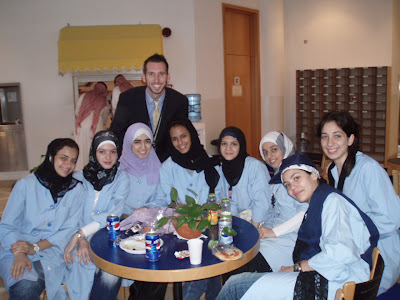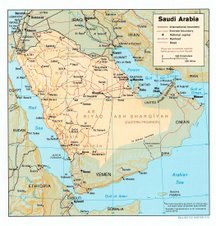I have
received more questions to answer!
(1)
Will we see the "poorer" side of Saudi Arabia?We have a very tight schedule, as you can see. Due to the VIP nature of our trip, we will not be
meeting with
underprivileged Saudis. What I have learned though is that one of the pillars of Islam is to help support the poor. I need to ask some people more specifically how they do this. Today there was a woman, child in arm, begging in the busy street. I noticed a car offer her money. It reminds me of how I often see homeless in Minneapolis. Saudi Arabia has its share of both the poor, the affluent, and the generous and kind. (This is just one of many parallels I draw between our societies.)
(2)
Have I tasted camel milk? When we were at the camel farm, we go to milk the camel! (It was so fun to be with those sweet animals...remind me to make the sound for you.) Anyway, I did taste a little of the milk, and it didn't make much of an impression on me. I think I have to try it before I leave...it's just one of those experiences! I do have regular chocolate milk in my mini-fridge at the Hilton...maybe I will try that tomorrow :-)
(3)
How is the weather in Jeddah? The weather in
Jeddah is beautiful! I'm not exactly sure of the temperature, but it's in the 80s, if not the 90s. It is a comfortable heat. (Plus, we are never too far from frigid air-conditioning!) I can't say that I smell the sea, but it is
definitely a pleasant air to breathe. I certainly don't miss the snow that I hear Minnesota just got!
(4)
Have I encountered any situations where people won't talk to you or are hesitant to have their photo taken? Such a great question
YEG! People have been extremely open with me, and the group in general. We have had opportunities to ask questions in a large setting, and at more intimate times at meals. Of course many of our questions relate to the women's movement (which I think parallels the US women's movement), education, Islam, and the like. At the same time, I've been in conversations about public punishments/executions (the people we have met haven't really experienced them, but they know about them), consumption of alcohol (forbidden, but still
existent under the surface), homosexuality (also forbidden but
existent), dating (also forbidden but carried out secretly in the more liberal city of
Jeddah), as well as other "controversial topics." That being said, there have been instances of silence or changes of subject. For example, at a meeting with the staff of the Saudi Gazette (English paper for Ex-pats), one of our group members asked about the lack of freedom of speech and the impact on the paper. This drew total silence, until the American staff member said that they have limitations but that they're pushing the
envelope when they can. (The Kingdom is making great strides, just in baby steps.)
(5)
How far have women come in comparison to neighboring countries? Another excellent question! From what I've learned, Saudi Arabia is more conservative and less progressive for women. However, the last few years, particularly under the leadership of Kind Abdullah have seen significant change, including more female positions in the Chamber of Commerce. As our new friend Asir said, women will be more powerful than the men in 10 years! (Based on the amazing women I have met here, I don't doubt it.)(6) What percentage of the population speak English? English is
compulsory in the schools, but just like in the US, taking a foreign language and being able to speak it are two different things. Everyone in our delegation and our guests at meals and events speak English. In fact, I'm not kidding when I say there are a number of people who speak more fluently and articulately than I do. Many of the laborers working as servants, hotel workers, etc. are from other countries, and don't
necessarily have the English skills. They still share a friendly smile and the pleasantries. Speaking of language, in an extremely wise and compassionate speech we heard tonight, the speaker pointed out how the US does little to promote the Arabic language in its schools. I have thought about this many times. It reflects quite poorly on the US understanding of global relations. Shouldn't we be training more teachers? Isn't the Arab speaking world a significant and
necessary part of our lives? Think those over!
Let me tell you, learning some phrases before I left has made a big difference. When our guests greet me with "hello" in the morning, I shoot back "Sabah el hier," which inevitably gets a smile, a firmer handshake, and a genuine, warm feeling.(7) What are the prices like compared to the US? This all depends on where you're shopping! Breakfast at the Hilton is SUPER expensive--90 Riyals or 25$ (thanks Aramco for paying!) But, today at an art exhibit, I bought two nice sized prints and two post card prints for112 Riyals, or app. 30$. To me, this seems
extremely reasonable! Tomorrow we are visiting a
souq, market, where I will have a better idea.
(8) Do many people have pets? I don't think it's as common as in the US. But, the artist we visited today had a few birds, and I have seen cats at a few houses. (No dogs though...)
(9) Have I met any Saudi vegetarians? No. But, I asked today and there are some, but it's relatively rare. Lamb, chicken, beef, and seafood have been main dishes at every meal. (Extremely delicious I might add! I don't know how I will go back.) The hummus here too is amazing.
(10) How was I able to take a picture of a Saudi woman? I have had some misconceptions of my own cleared up on this trip. While there is a passage in the Koran that refers to woman speaking behind a curtain, the appearance of women in society is more rooted in hundreds of years of tradition.
Like with traditions in
all world cultures, some members of society adhere to them more, or
differently, than others. Certain women
CHOOSE to cover their entire faces. They are also the women who don't like to be photographed. This is because they wish to protect themselves and save their beauty for their husbands. Having been here for a number of days, I really grasp this concept like never before. At the same time, there are women who are more liberal, and are willing to show some bangs, their face, and to be photographed. It all depends on the women's
CHOICE and FAMILY TRADITION. Think of it like this, when you were growing up, how did your parents respond to what you chose to wear? Now imagine, if for hundreds and hundreds of years, generations had worn the same clothing as a sign of respect, dignity, and honor, would you acknowledge and respect that tradition? (Just something to keep in mind.) We can't just apply our American point of view, as we are only 300 million (and a diverse group at that!) of a world of 6+ Billion.....
KEEP THE GREAT QUESTIONS COMING!























